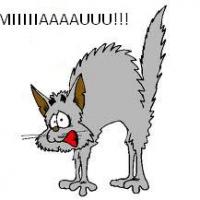Съобщения: 12
Език: English
Alkanadi (Покажи профила) 25 септември 2014, 14:26:34
for example, Lernolibro = Textbook. Shouldn't it be spelled and pronounced Lernlibro.
When making new words, how do you know to remove or keep the last letter of the first word?
nornen (Покажи профила) 25 септември 2014, 14:32:58
For instance Zamenhof used "postesigno" and "antauxsigno" and "supersigno". I suppose that he deemed the cluster "-sts-" in "*postsigno" hard to pronounce.
Another Zamenhovian example is "patrodomo". The word "*patrdomo" might be hard to pronounce.
Now with "lernlibro" I don't see much of a need to insert an euphonic bridge.
sergejm (Покажи профила) 25 септември 2014, 16:14:04
But sometimes adding of the vowel changes the sence;
unuvice in one row
unuavice in the first row
antaŭiri precide
antaŭeiri go at ahead
antaŭeniri go to ahead
bartlett22183 (Покажи профила) 25 септември 2014, 17:58:45
 Yes, young children in immersion environments can learn and use all sorts of phonological / phonotactic contortions.
Yes, young children in immersion environments can learn and use all sorts of phonological / phonotactic contortions.However, although there are a minority of individuals who learn E-o as relatively young children from their parents, the majority are probably after puberty, when language learning becomes much harder. I myself do not have a personal problem with many of the consonant clusters in E-o, but that is because I natively speak a (structurally) Germanic tongue in which similar clusters occur. Nevertheless, there may be many proposed (adult) learners who speak languages with other phonotactics, so I propose that we make things as easy for them as possible within the broader principles of Esperanto and avoid consonant clusters insofar as the principles allow.
nornen (Покажи профила) 25 септември 2014, 19:22:01
----
"ftiz/" alone is already a root which in my humble opinion is somewhat strange. Zamenhof maintained the aspiration on the first consonant (ph) but dropped the aspiration on the second one (th). Which is quite obvious because Esperanto doesn't have dental fricatives. But this left us with an onset in which the sonority hierarchy is broken.
antoniomoya (Покажи профила) 25 септември 2014, 20:36:31
Alkanadi:How come when some words are combined, the last letter of the first word is omitted, while other words are formed with the last letter of the first word present?Use your common sense. It's that simple.
For example, Lernolibro = Textbook. Shouldn't it be spelled and pronounced Lernlibro.
When making new words, how do you know to remove or keep the last letter of the first word?
"Manĝotablo" or "Manĝtablo"?
"Dormoĉambro" or "dormĉambro"?
Which is easier to pronounce? That's then the solution!
Amike.
Alkanadi (Покажи профила) 28 септември 2014, 09:32:05
antoniomoya:Both are just as easy for me. I think that other language speakers have consonant clusters, which would make it hard for me and easy for them or vice versa.
Use your common sense. It's that simple.
"Manĝotablo" or "Manĝtablo"?
"Dormoĉambro" or "dormĉambro"?
Which is easier to pronounce? That's then the solution!
Scii is a really hard one for me to say. I still don't say it properly. I say sit-see-ee. People will understand but it is not how it should be said. I think people in Russia or Poland find it easy to say. Just because it is easy or hard doesn't make it wrong or right. I think.
But don't trust me because I am a beginner. I don't know what I am talking about.
erinja (Покажи профила) 28 септември 2014, 12:43:12
sudanglo (Покажи профила) 28 септември 2014, 12:51:56
1. The most common is to make the word more easily pronounceable - lernolibro.
2. Sometimes it is necessary to avoid confusion with another word eg posteulo (successor), postulo (demand).
3. Sometimes it is used to spell out the meaning or parsing - nepagipovaj landoj, duaklasa vagono, hejmeniri, Esperanto-kongreso.
RiotNrrd (Покажи профила) 05 октомври 2014, 20:09:52
Alkanadi:...I say sit-see-ee...Say it sss-tsee-ee.
sss = hiss like a snake. One sound, sssssssssss, except shorter.
If you have trouble with the "ts" combination, try this:
Using only the tip of your tongue to stop or start the sound, say
sss-sss-sss-sss...
and then realize that after about the second or third stop/start, you are saying the "ts" sound.







